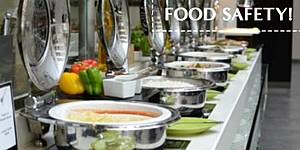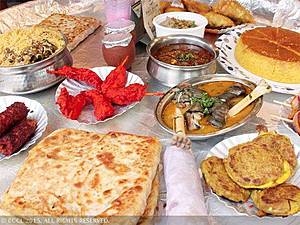Food Safety in Hotels and Restaurants-An Important Aspect of the Hospitality Sector Development

Urbanization and changes in consumer habits, human movement including travel, sports and leisure, doing business, socio-economic and political engagements have increased the number of people buying and eating food prepared and sold in public places (hotels and restaurants). Globalization has triggered growing consumer demand for a wider variety of foods, resulting in an increasingly complex and longer global food chain and intensification and industrialization of agriculture and animal production to meet increasing demand for food. These situations create both opportunities and challenges for food contamination.
Food can become contaminated at any point of production and distribution, and the primary responsibility lies with food handlers. Yet a large proportion of food-borne disease incidents are caused by foods improperly prepared or mishandled in food service establishments or markets. Unsafe food poses global health threats, endangering everyone; infants, young children, adults, pregnant women, the elderly and those with an underlying illness are particularly vulnerable.

Food-borne illnesses are usually infectious or toxic in nature and are caused by biological (bacteria, viruses, moulds, yeasts and protozoa) or chemical substances entering the body through contaminated food or water. Chemical contamination can lead to acute poisoning or fatal diseases such as cancer. Those diseases may lead to long-lasting disability and death. “Food contamination and water-borne illnesses kill an estimated 2 million people annually, mostly children and particularly in developing countries”; inform FAO/WHO (2016).
In addition to chemical and biological hazards, illnesses due to food poisoning may be caused by physical hazards when a foreign object enters the food and is eaten. The most occurring physical contaminants are hazardous material including metal, glass, wood, stones, bone and insulation.
Food sold in supermarket or eaten in restaurants may get contaminated because of poor handling, poor temperature (cold or heat) control and use of expired products and most of those products, such as meat and fish and derived products, fresh fruits and vegetables, are frequently manipulated by workers and more susceptible to contamination and require cold storages conditions.
Not all food handlers in supermarket and food establishment (restaurants, hotels) understand the roles they must play to protect the life of the wider community. Good personal hygiene practices are an essential part of providing safe food to our customers. Among these hygiene practices, the most important is hand washing and behaving and operating in an appropriate manner.
Personnel should always wash their hands when personal cleanliness may affect food safety, for example: at the start of food handling activities; immediately after using the toilet; and after handling raw food or any contaminated material, where this could result in contamination of other food stuff; practitioners should avoid handling ready-to-eat food, where appropriate.
Food handlers should maintain a high degree of personal cleanliness and, where appropriate, wear suitable protective clothing. People engaged in food handling activities should refrain from behavior which could result in contamination of food, for example: smoking; spitting; chewing or eating; sneezing or coughing over uncovered food.
As mentioned above, effective temperature control is key for food hazard control. Equipment used to cook, heat treat, cool, store or freeze food should be designed and calibrated to achieve the required food temperatures as rapidly as necessary in the interests of food safety and suitability, and also maintained effectively. Such equipment should also be designed to allow temperatures to be monitored and controlled.
In addition to personal hygiene and control of temperature, location, design and layout of infrastructure and equipment used in supermarket and food establishment may affect the safety and quality of the food. Food establishments should not be located anywhere where, after considering such protective measures, it is clear that there will remain a threat to food safety or suitability; and the layout and internal structures and fittings should be as to facilitate cleaning and where necessary disinfection.
Equipment and containers coming into contact with food should be designed and constructed to ensure that, where necessary, they can be adequately cleaned, disinfected and maintained to avoid the contamination of food and made of materials with no toxic effect.
Food hygiene training is fundamentally important. All personnel in supermarket and restaurant should be aware of their role and responsibility in protecting food from contamination or deterioration. Food handlers should have the necessary knowledge and skills to enable them to handle food hygienically. Those who handle strong cleaning chemicals or other potentially hazardous chemicals should be instructed in safe handling techniques.
In its standards education program, Rwanda Standards Board (RSB) offers trainings destined to raising awareness of food hygiene and safety. Those trainings include, but are not limited to specific food stuffs product standard training, general requirements for food hygiene, Hazard Analysis and Critical Control Point (HACCP) and Food Safety Management Systems (FSMS). A number of establishments have been HACCP or FSMS-certified and many others are in pipeline. Hospitality sector practitioners are encouraged to apply for any of those trainings as a way to consistently be competitive on this mushrooming sector that attracts immense opportunities in the Rwandan economy.
In order to prevent food deterioration, food poisoning or any other hazards that may be due to changing storage conditions, RSB through its metrology services, offers calibration services in hotels, restaurants or any other services in need. RSB temperature laboratory conducts calibration of thermometers, laboratory ovens, incubators, cold rooms, autoclaves, fridges and freezers, coolers, furnaces and truck refrigerators; to ensure measurements are effectively maintained depending on storage conditions required for every specific food stuffs or other product.